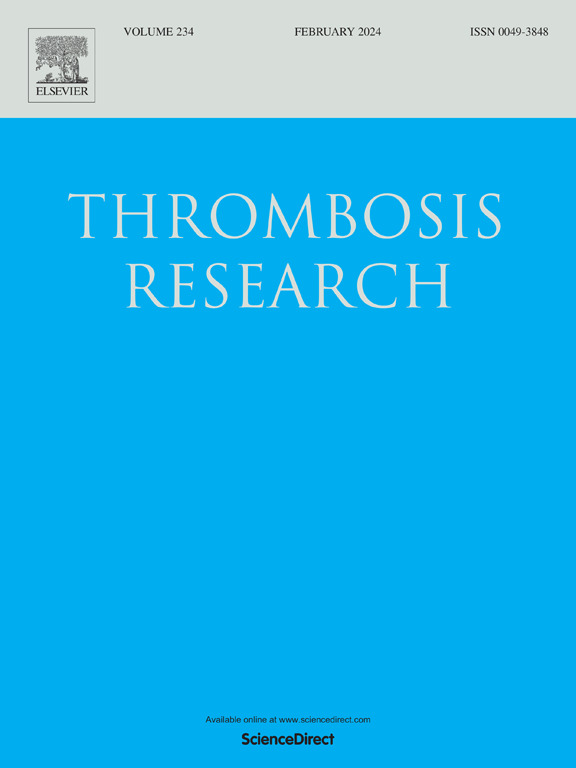Disparities in menstrual bleeding management during acute venous thromboembolism treatment: A review of UK practice and a call for clinical studies
IF 3.7
3区 医学
Q1 HEMATOLOGY
引用次数: 0
Abstract
Background
Heavy menstrual bleeding (HMB) is a significant clinical burden for premenopausal individuals treated with anticoagulation for acute venous thromboembolism (VTE). Despite its prevalence, HMB management remains poorly studied, with wide variation in clinical practice.
Objectives
The current study aimed to explore current UK practices in managing HMB in anticoagulated individuals and identify areas requiring clinical research to address disparities.
Methods
A national survey was conducted among haematology consultants and consultant clinical pharmacists managing anticoagulated patients. The survey focused on management strategies, including anticoagulant selection, use of tranexamic acid (TXA), contraceptive options, and anticoagulation interruption.
Results and conclusion
Responses were collected from 102 participants, across the UK. Apixaban was the preferred anticoagulant for patients with HMB, followed by LMWH then dabigatran. Timing of TXA initiation varied widely between respondents, with (35.3 %) prescribing it any time after anticoagulation initiation, (11.8 %) delaying TXA use for 3 months, and (7.8 %) would not give it at all. (47.1 %) of respondents advise to discontinue oestrogen containing contraceptives in patients with acute VTE. Almost all respondents never or rarely stop anticoagulation for a patient with HMB and recent VTE ≤4 weeks. (62.7 %) of respondents showed their willingness to participate in clinical studies to study TXA use in the setting of acute VTE ≤4 weeks in anticoagulated individuals.
This study highlights significant variations in HMB management during anticoagulation for acute VTE. Disparities raise concerns about health inequities and underscore the urgent need for prospective clinical trials to improve patient outcomes.
急性静脉血栓栓塞治疗期间月经出血管理的差异:英国实践的回顾和临床研究的呼吁。
背景:大量月经出血(HMB)是绝经前患者接受抗凝治疗急性静脉血栓栓塞(VTE)的重要临床负担。尽管HMB很普遍,但对其管理的研究仍然很少,在临床实践中差异很大。目的:本研究旨在探讨当前英国在管理抗凝个体HMB方面的实践,并确定需要临床研究的领域,以解决差异。方法:对全国管理抗凝患者的血液科会诊医师和会诊临床药师进行调查。调查的重点是管理策略,包括抗凝剂的选择、氨甲环酸(TXA)的使用、避孕选择和抗凝中断。结果和结论:收集了来自英国各地102名参与者的回复。阿哌沙班是HMB患者首选的抗凝剂,其次是低分子肝素,然后是达比加群。在受访者中,起效TXA的时间差异很大,(35.3%)在抗凝开始后的任何时间开处方,(11.8%)延迟3个月使用TXA,(7.8%)根本不给药。(47.1%)的应答者建议急性静脉血栓栓塞患者停用含雌激素的避孕药。几乎所有的应答者对于HMB和静脉血栓栓塞≤4周的患者从未或很少停止抗凝。(62.7%)的应答者表示愿意参加临床研究,研究TXA在抗凝患者急性静脉血栓栓塞≤4周的情况下的应用。这项研究强调了急性静脉血栓栓塞抗凝期间HMB管理的显著差异。这些差异引起了人们对卫生不公平的关注,并强调迫切需要进行前瞻性临床试验以改善患者的预后。
本文章由计算机程序翻译,如有差异,请以英文原文为准。
求助全文
约1分钟内获得全文
求助全文
来源期刊

Thrombosis research
医学-外周血管病
CiteScore
14.60
自引率
4.00%
发文量
364
审稿时长
31 days
期刊介绍:
Thrombosis Research is an international journal dedicated to the swift dissemination of new information on thrombosis, hemostasis, and vascular biology, aimed at advancing both science and clinical care. The journal publishes peer-reviewed original research, reviews, editorials, opinions, and critiques, covering both basic and clinical studies. Priority is given to research that promises novel approaches in the diagnosis, therapy, prognosis, and prevention of thrombotic and hemorrhagic diseases.
 求助内容:
求助内容: 应助结果提醒方式:
应助结果提醒方式:


